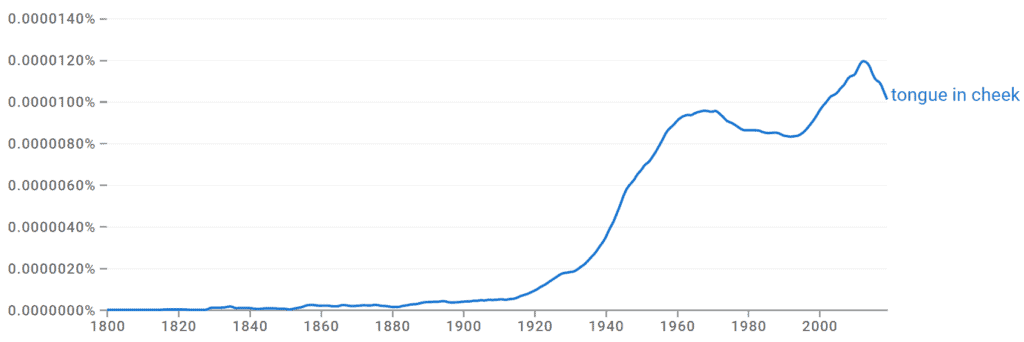As a purveyor of words, I find idiomatic expressions both fascinating and insightful. One expression that always pops into my head when I hear the word idiom is “tongue in cheek.” So, I figured I’d help others and explain the meaning, origin, and proper usage of this phrase. Buckle up!
What Does Tongue in Cheek Mean?

“Tongue in cheek” is a pretty common English idiom, and it refers to some statements or remarks people make in jest or even irony. It’s often playfully mocking or satirizing a certain situation or person.
When you use this phrase, you’re intending for others to see that your words aren’t meant to be taken literally or seriously.
If I’m not writing, I’m surely reading, and I love discovering books with a sort of tongue-in-cheek comedy, whether in overall tone or from a specific character. It always adds a bit of depth to the story and gives it personality.
Is Tongue-in-Cheek an Adjective?
You bet! “Tongue-in-cheek” can function as a phrasal adjective to describe something as funny, ironic, or sometimes satirical. For example, when I refer to a “tongue-in-cheek comment,” I’m trying to emphasize the playful or ironic nature of the remark.
Is Tongue in Cheek Hyphenated?
Like a lot of phrases and idioms, when used as an adjective with a noun, “tongue in cheek” is usually hyphenated, as in “tongue-in-cheek.” But, when used as an adverb, the hyphens are typically left out, and the phrase is written as “tongue in cheek.”
- Adjective: David said that comment in a very tongue-in-cheek way. (Modifies the word way)
- Adverb: He offered the proposal tongue in cheek. (Modifies the verb offered)
Origin of the Phrase Tongue in Cheek

The phrase “tongue in cheek” originated in the 1800s. It’s said that placing your tongue inside your cheek was a physical gesture indicating insincerity or playfulness. This gesture eventually gave rise to the idiom we use today.
Tongue in Cheek vs. Sarcasm
Yes, both tongue in cheek and sarcasm involve humor and irony, but I assure you they differ in their intent and tone.
Tongue-in-cheek humor is usually more lighthearted, playful, and subtle. Sarcasm tends to be more biting, caustic, and direct.
When I use tongue-in-cheek remarks, I aim to amuse or gently mock them, but my sarcasm sometimes carries a more negative or critical connotation.
What’s Another Word for Tongue in Cheek?
- Ironic
- Wry
- Satirical
- Facetious
- Humorous
- Playful
- Mocking
Tongue-in-Cheek Examples in a Sentence

- I made a tongue-in-cheek remark about the boss’s new haircut, and everyone busted out in laughter.
- The movie is a tongue-in-cheek parody of popular superhero films, poking fun at their clichés and tropes, so it should be a fun time.
- Kayla’s tongue-in-cheek blog post about the challenges of parenthood was both amusing and relatable, so I shared it with my mommy group.
- The new marketing campaign we’re doing uses tongue-in-cheek humor to showcase how the product isn’t meant to be taken seriously.
- Mike’s tongue-in-cheek comment about the “excellent” weather during the torrential downpour made us all smile but also grimace.
- This new book has pleasant tongue-in-cheek humor that I love so much!
- You can’t be too serious at this convention; it’s strictly tongue-in-cheek.
- Her style is very tongue in cheek and gives nods to the eras she loves so much.
It’s All Good Fun
The adjective and adverb tongue in cheek is such a versatile idiom that can add a layer of humor and irony to whatever you’re saying. By understanding its true meaning, we can appreciate the richness and depth of the English language. Whether used as an adjective or adverb, it’s a valuable tool for conveying wit and satire in your everyday conversations.
